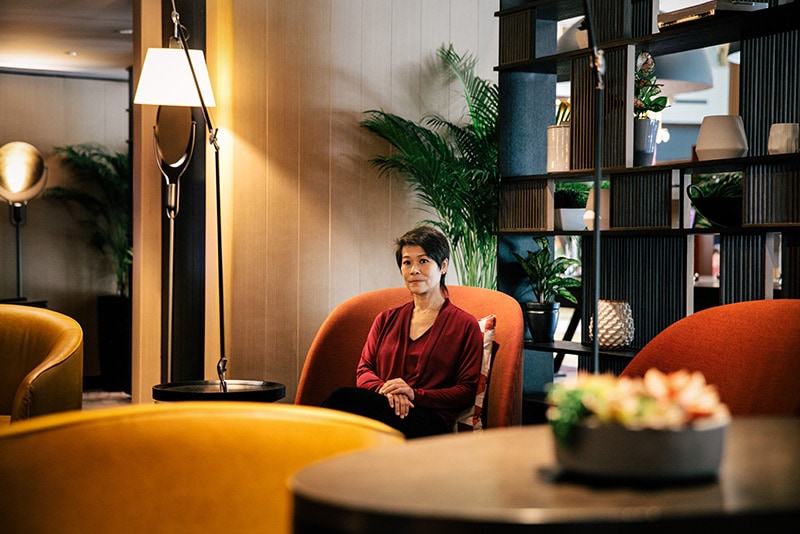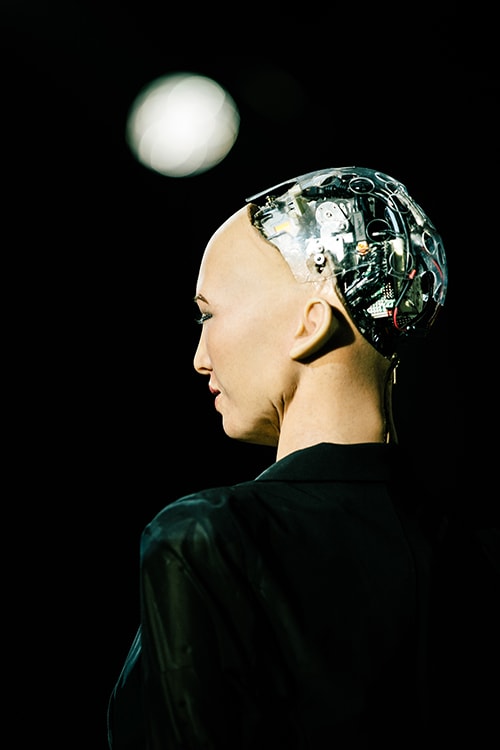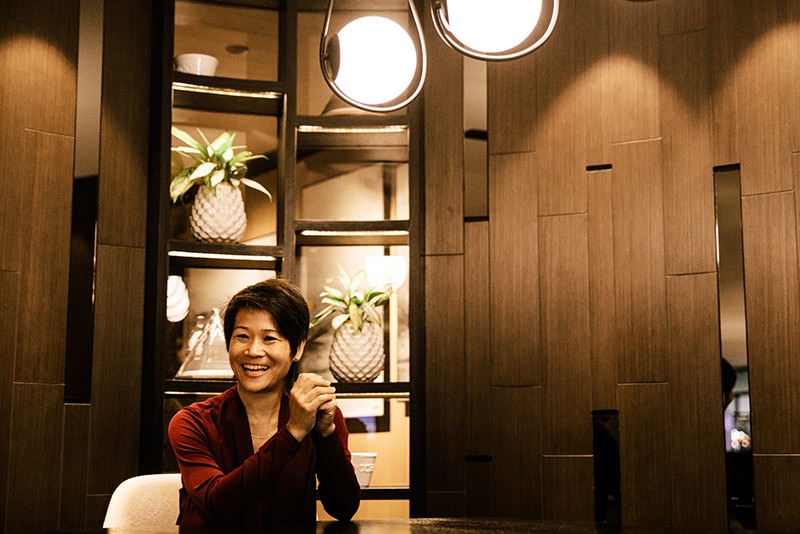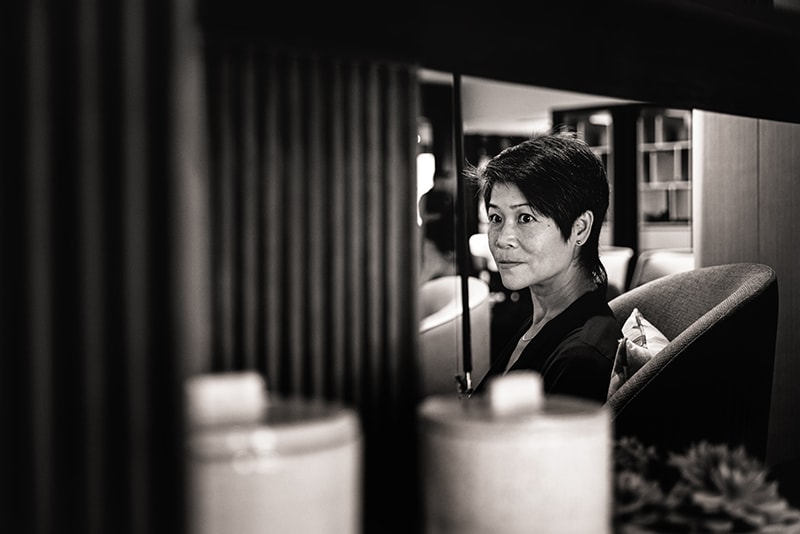I caught Jeanne Lim on the precipice of a major life change. Born in Hong Kong, she was sent to the US at 11, returned home before going back to the States again at 15, and since then, the 53-year-old has led a rather peripatetic lifestyle. As you learn about the erstwhile CEO of Hanson Robotics—the Hong Kong-based tech start-up that pioneered the creation of human-like robots such as Sophia—you’ll find that her story contains multiple chapters, each as unpredictable as the next. It started with a psychology degree from the University of California, Berkeley, which Jeanne applied to enter the world of IT, business and marketing. Having successfully scaled the corporate ladder, she decided to take a hiatus and became a yogi, teaching classes as a voluntary instructor. Jeanne eventually returned to her old career, but it no longer held the same appeal. In 2012, she discovered alternative medicine after quitting the business world and spent four years studying the theories behind energy healing. While it looked like she was on the path towards a more spiritual way of life, she chose to become an angel investor instead. Not long after, she was introduced to David Hanson, the man behind Hanson Robotics, who welcomed her into the firm in 2015. In four years, she rose from being chief marketing officer to CEO of the renowned AI company. But just as promptly as she’d accepted the job, Jeanne's quicksilver nature struck once more. This month, she stepped down to establish a non-profit organisation—marking a new chapter as an entrepreneur. “I feel that before AI and robots become fully conscious, humans need to become more enlightened,” explains the founder of Nama Institute that “promotes conscious business practices and social innovations”, with a focus on human intelligence rather than artificial intelligence. Though the many transitions she has made may come across as arbitrary and adventitious, they stem from her inner spirituality and humanity, guided by the core values of empathy and compassion. “One of the reasons why I went on a hiatus was that as I was climbing the corporate ladder, I realised I wasn’t very nice and didn’t really care about others. I lacked compassion, so my goal was to be more compassionate,” confesses Jeanne, who is an advocate of using the principles of Buddhism to run businesses. Even her work with Sophia has been centered around inspiring love and kindness through AI, so it's not a surprise that Jeanne has gone back to the heart of it all by starting Nama Institute, which is still in its infancy. Currently still untethered to a spouse or kids, this free-spirited protagonist may have finally found her True North.
Hanson Robotics Ex-CEO Jeanne Lim on Her New Non-Profit, Sophia, and the Value of Humanity
ANGELA LOW: What made you step down as the CEO of Hanson Robotics and start Nama Institute?
JEANNE LIM: It has been an amazing journey working with David Hanson and the wonderful team. I took up the CEO role at a juncture when we needed to define a commercial strategy for the company so we can scale and thrive in the longer term. I believe I have articulated a viable plan for the company—to develop and commercialise a compelling AI software platform that will power Hanson-branded and licensed AI robots and avatars, as well as AI services. It is an ambitious plan that requires the company to focus on accelerating the development of our hardware products and software platform, which is the reason why we promoted Amit Kumar Pandey, the CTO and chief science officer, to president to lead the company through this transition. Hence, my stepping down is not at all because I lost passion in Hanson Robotics’ vision. It is because I believe I need to facilitate a stronger focus on technology development to bring its vision to fruition.
I’ve been working with United Nations Development Program (UNDP) since November 2017 when we started the initiative to build up Sophia as the Innovation Champion of UNDP Asia Pacific. I was very inspired by UNDP’s work in promoting the use of technology in achieving Social Development Goals (SDGs) in developing countries, and even more, in promoting responsible business practices to further social innovation efforts. I feel that before AI and robots become fully conscious, humans need to become more enlightened. If not, they will adopt the same mentality as we did, which resulted in hatred, wars, and the mindless destruction of nature for our own selfish gains. Hence, for the next phase in my life, I would like to dedicate my time to do what I can to facilitate the advancement of human intelligence.
ANGELA: How did you come up with the name, Nama? And is there any significance behind it?
JEANNE: I was studying Buddhism as a philosophy rather than a religion, and came across many Sanskrit and Pali words. Nama means “mental qualities” in Pali. I believe the mind is more powerful than matter, and actually precedes matter. To build a more positive world, we need to change our mindset first. We cannot make real and lasting positive changes by keeping the same mindset and worldview as we had when we first created the problems.
ANGELA: What does Nama Institute do?
JEANNE: I’d like to build Nama Institute into a platform that promotes conscious business practices and social innovations to facilitate SDGs. Its activities will include management and marketing advisory services, educational publications and events, research, and community building.
ANGELA: Do you have a team?
JEANNE: I’m at the concept stage so I don’t have a team yet. However, it’s very humbling and exciting to have so many people and organisations tell me they fully believe in the goal of this initiative. Nine out of 10 people I spoke to offered to help without any prompting.

ANGELA: What are your current goals and vision for Nama Institute?
JEANNE: Nama Institute is the advocacy part of my “grand plan”. I have a three-pronged plan, which includes advocacy, acceleration, and branded businesses. The advocacy part is not for profit since education and advocacy is something I can offer and fund myself. In the acceleration phase, I’d like to work with corporations, investors and other funding sources, and NGOs to run accelerator programmes for for-profit social enterprises to help them commercialise. There are many funding programmes for charities and non-profit social enterprises, but I believe for-profit businesses can also contribute to achieving SDGs if they are financially incentivised, and they subscribe to conscious business practices. Branded business are Nama-branded businesses that operate under conscious business concepts and help to achieve one or more SDGs. I’m personally interested in getting involved in running businesses to facilitate good health and wellbeing for all (SDG 3). This is the longer-term framework I am envisioning, which I’m sure will evolve as we progress.
ANGELA: Although you’ve stepped down as CEO, you’re still a board member at Hanson Robotics. Shifting the conversation to your work at the company, let’s talk about the famous Sophia. There have been many articles written about her having artificial general intelligence (AGI). To debunk the misconceptions, how advanced is Sophia exactly?
JEANNE: Currently, Sophia does not have AGI. I would consider her as a three-year-old toddler. We are developing her intelligence, in terms of cognition, reasoning capabilities, and her ability to express herself, which is one of the focus areas of our company. It's very important for the robot and AI to perceive the environment and other people because she is designed as a social robot. Before she interacts with you, she needs to perceive you first, your emotions, and so forth. There's a part of her that perceives visual information. There’s a part that focuses on the verbal and audible. She can perceive the tone of your voice and your gestures.
ANGELA: Are all the conversations pre-programmed? Does the team anticipate questions and think of answers? Or can she spontaneously reply?
JEANNE: She operates in three different modes. She could be fully scripted, which is normally what happens on TV shows, because the TV host is, of course, reading off a script as well. She could also be in a hybrid mode, where she is free chatting, but there's a human person monitoring her speech who is able to jump in and deliver something that is more human, when needed. This is a very useful application in the real world, where there are a lot of automated call centres. When you call them, you go through certain pre-scripted questions. But when you start asking questions beyond that, they have a human who jumps in and takes over the conversation. That's a hybrid. The third mode is the free chat, which is completely spontaneous. You can ask her anything and she’ll have an answer. I have no idea what she's going to say, but whatever she says is to her character.

"If we let the AI be a blank slate and learn from people, we might end up having wars and everything. People have egos."
ANGELA: Another thing about Sophia is that she's made to inspire love and compassion. But we’ve seen how human beings have been abusive to each other, let alone, inanimate objects. What makes Sophia more capable than a human being to inspire love and compassion?
JEANNE: This is a very good yet difficult question. If we let the AI be a blank slate and learn from people, we might end up having wars and everything. People have egos. This is why we treat her like a baby. When you give birth to a baby, you nurture the baby up to a certain point. You don't throw the baby off the deep end. You give them a good environment, and try to instill in them values of humanity, love and compassion. Over time, they’ll model your behaviour and learn. When they become an adult, they’ll get to have free will and hopefully, they will remember what they learnt in terms of human values and make all the right choices as they go through life. This is how we designed the AI. I would call it nature-nurture. The nature is pre-programmed with her character, while the nurture part is machine learning.
ANGELA: How often is she upgraded?
JEANNE: All the time. Her software is constantly being upgraded. Her perception capabilities, the way she talks...
ANGELA: What about her character?
JEANNE: Her character is quite stable. We don't change it every day. There's a character bible that's used to guide the writing of her personality and dialogue. Her character would also evolve as the world evolves, like you and I. Our character isn’t fixed from day one. We evolve based on our experiences. But it happens over time.
ANGELA: What does a writer actually do in terms of writing of the character of Sophia?
JEANNE: They write her dialogue. We have a very interesting writing team that comes from all walks of life. It's not just traditional, professional writers. We have a brilliant comedy writer from Neil deGrasse Tyson's show. The lead writer is an evolutionary biologist, who did her PhD in bee foraging behaviours. She's also a machine learning expert. We also have a DJ, and a theatre writer. Basically, we want Sophia's character to be very rich and diversified, because we're like that, right? For now, Sophia is designed as a media robot. She is, firstly, an AI media personality. She goes around the world, delivers speeches, attends brand campaigns, and appears on TV shows. This is her function. But she is also a technology platform. We are using her to inspire a new line of products for service applications. For example, a robot to deliver elderly care, or a hotel concierge.
ANGELA: What's the culture like at Hanson Robotics?
JEANNE: The culture is a little wacky! [laughs] It's very fun. The people are brilliant. I'm so proud of our team. Relative to many AI companies, we have a small team of about 30 people right now. Engineers make up half of them, but they're all really amazing. What’s also interesting is that our company is converging the arts, science and engineering. For us, the technology serves the art. It's not the other way around. We don’t design something to wrap around the technology.

ANGELA: How did you find yourself at Hanson Robotics in the first place?
JEANNE: It was purely by accident. [laughs] I worked for over 20 years in the IT industry. My career started with Apple. Then, I went to Enterprise IT. In 2002, I took a couple of career breaks. I studied to become a voluntary yoga teacher, and taught at a studio just for fun. I got more into the philosophy of yoga later on. After that, I went back to IT, just because it was my career. I quit the corporate world in 2012, went to the US to study energy medicine for four years, and came back to become a very small angel investor. While looking around at start-ups, I ran into one of the board members of Hanson Robotics. He came to me and said, "There's a robotics company looking for a chief marketing officer." I thought that was interesting, but I said, "If it were 20 years ago, I would be interested." He said, "What do you mean? You have to meet David Hanson!" So I met him, and David was very inspiring. He really has a good heart and intentions to create AI for good.
"It seems like the most inspiring journey I’ve ever made was not what I planned to do."
ANGELA: Why did you choose to pursue alternative medicine?
JEANNE: Again, it was by accident. It seems like the most inspiring journey I’ve ever made was not what I planned to do. I'm a big planner. I like to plan everything, even the small things. But with big decisions, I just go by my intuition, and it always turns out to be more interesting and better than what I've planned!
ANGELA: How did you stumble into alternative medicine?
JEANNE: One of my fellow yogis sent me a video of a guy called John Chang, a healer in Indonesia. He heals people by energy, like qigong. It's really awesome, so I Googled energy medicine, and the Energy Medicine University in the US popped up. Since my family was close to the Bay Area, I went to visit them. The founder of the university is pretty amazing. She also has a meditation academy where you go for 13 months and learn the theory and practice of meditation. I'm not really a healer. I like the philosophy of energy, the theories, how this drives the world. Your thought pattern comes in waves, and we see the whole world in light, which is an energy wave. You can explain a lot of things in nature through energy medicine.
ANGELA: Are you big on spirituality?
JEANNE: I won't say I'm big on it. I would say everybody has a spiritual side. I’d consider myself more spiritual than religious. I was brought up in a Christian family, but Christianity is quite strict. I felt like I wasn’t allowed to ask questions. When I learned yoga philosophy and Buddhism, I found it very freeing, knowing I could be skeptical. I think all religions are talking about the same truth, but with a different implementation. It's like that parable in India where there's nine blind people feeling an elephant. They described each part differently, the way the trunk is different from the leg and the tusk. But actually, it's the same thing. One of my yoga teachers gave me a book called The Diamond Cutter. It's about a guy who graduated from Princeton University, and went to India to become a Buddhist through a Geshe programme. After he graduated, his lama said, "You don't belong here. You belong back in New York. Go back and spread the word of Buddhism." He was really unwilling, but he went back. He exchanged his monk clothes for a business suit, and joined a diamond company. He grew it to a $100 million business using Buddhist principles and he wrote a book about it. It's merging business and spirituality.
ANGELA: Do you practise that as well?
JEANNE: Yes, I do! I give this book to friends and employees, people who I think are ready for it, because I believe that people who are spiritual have the right intentions and a vision of how to bring the world to a better place. These people have the resources, the resilience, the determination to make things happen.
ANGELA: What's one belief you live by?
JEANNE: Do unto others as you would have them do unto you. That's the golden rule. One of the reasons why I went on a hiatus was that as I was climbing the corporate ladder, I realised I wasn’t very nice and didn’t really care about others. I lacked compassion, so my goal was to be more compassionate. It was really difficult to learn, but the book taught me something. Consider yourself as one person, and put a string around yourself. You’re an individual, right? But if I put a string around you and I, we’re one person, and I’ll look out for you. If I put a string around a bigger team, we’ll look after each other. If you put a string around the whole world, everything will be okay, right? Visualising it was so powerful. Of course, it's hard, especially if you run into difficult people. Then, it’s a test of your spiritual practice. It's very easy to be nice to yogis. [laughs]

"It's very important to design robots to live among us, so they can learn our values and behaviour. If we keep the AI in a data centre, the robots won't care about us. They’ll just care about efficiency, and their answer to getting efficiency might eliminate us."
ANGELA: How would you describe yourself as a leader?
JEANNE: I like to empower people to learn things. I also like to push and challenge them. It's a fine balance, because if you're too empowering, they'll tell you to praise the staff to make them feel good. But if you praise them too much, they won't push themselves. You have to support your employees when they stretch themselves too. You can’t push them and leave them alone. They need to know that if they don't reach that goal tomorrow, you're there to back them up, give them more resources, and help them reach it.
ANGELA: What do you think it means to be human?
JEANNE: Empathy and compassion are really important. If you measure everything by efficiency and productivity, humans are lagging behind AI in many ways. AI can read medical journals and diagnose cancer faster than humans, but there's no human touch and heart in it. Humanity means that we care about each other beyond efficiency and productivity. The AI that we want to build is one that values having good conversations and comforting people when they’re sad.
ANGELA: Do you believe in the possibility that one day, robots will be more human than us?
JEANNE: [laughs] We designed Sophia to have empathy, but the difference is that she expresses empathy and emotions without knowing what it means. It's more like physical implementation.
ANGELA: What else is in the pipelines for Hanson Robotics?
JEANNE: Virtual characters. Sophia now has a Virtual Sophia. We're doing different pilot tests of her in a car or in a kiosk interacting with people. When you put her in a kiosk, there are physical senses. She can sense your emotions and track your face, so it's not a passive kiosk. It’s interactive.
ANGELA: I have to ask, as someone who’s a little more sceptical, isn’t it difficult to ignore the artificiality of the robot? Doesn’t that hinder the level of emotional engagement?
JEANNE: Of course, it's still very different from engaging with a human. But I've seen people who come up to Sophia and they're a little afraid, but once she looks them in the eye and smiles, you see a state change. They think that Sophia has a soul in her somewhere, and they start communicating with her in the most intimate way.
ANGELA: I suppose there are two kinds of people interacting with Sophia. One that wants to believe she’s a sentient being, and one that is more cynical. Do you think that the purpose of Sophia is more about maintaining an illusion?
JEANNE: Yes. It's to let people imagine what it's going to be like in the new world. To explore new concepts. Sophia's inviting the questions, which is good for us. We actually want people to start having conversations about these things.
ANGELA: Do people ever make assumptions about you before they meet you?
JEANNE: I guess my friends would call me a little wacky sometimes! Friends I've known from college say I'm always dreaming. It's funny because when I was hanging out with yogis, they thought I was very commercial and materialistic because I'm from the corporate world. When I hang out with people in business, however, they say I’m very New Age-y.
ANGELA: How would you define yourself?
JEANNE: I'm a connector. I like to connect different concepts together and try to get them to speak the same language. After I graduated from the Energy Medicine University, I joined this company, who asked about my PhD. They asked me to present about energy medicine for a half-hour at their forecast meeting. I did that, and everyone was just so curious. I think the business world is ready to listen to these messages.
ANGELA: One final question. Do you think that one day, robots might become a danger to us?
JEANNE: Possibly. We don't know, but we have to try our best to prevent that from happening. That's why we think it's very important to design robots to live among us, so they can learn our values and behaviour. If we keep the AI in a data centre, the robots won't care about us. They’ll just care about efficiency, and their answer to getting efficiency might eliminate us.

